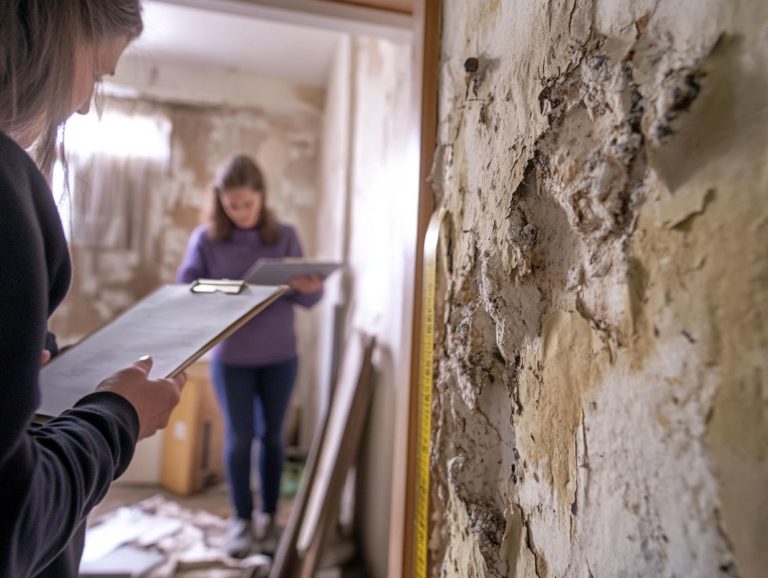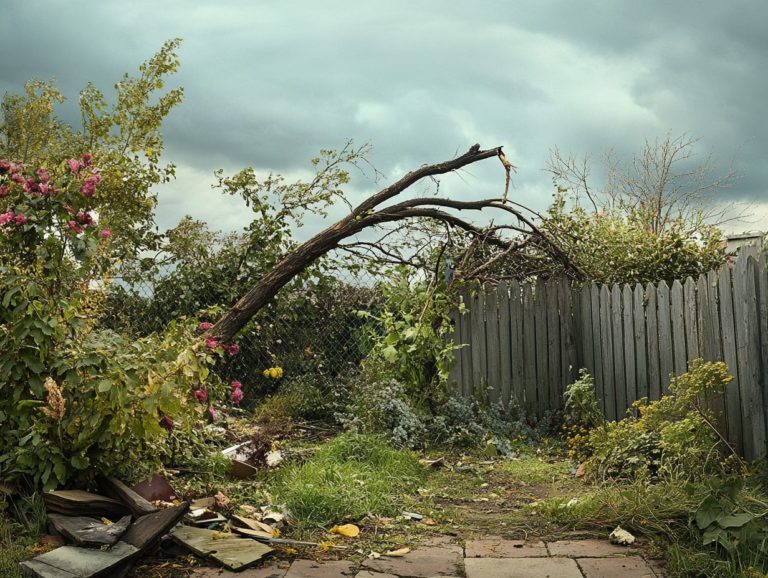Are Natural Disasters Covered by Home Insurance?
Home insurance serves as a vital shield for homeowners. Understanding what it covers can seem daunting, especially when it comes to natural disasters.
You may find yourself wondering what exactly your policy protects and whether you need to consider any extra measures. This article simplifies the essentials of home insurance, clearly outlining what is typically included and excluded, particularly in relation to natural disasters.
It also explores supplementary coverage options, critical steps for disaster preparedness, and the best course of action when the unexpected occurs. Get ready to equip yourself with vital knowledge to protect your home.
Contents
Key Takeaways:
- Home insurance typically covers fire, lightning, and windstorms.
- Flood and earthquake insurance are separate policies.
- Understanding your coverage before a disaster is essential.
Understanding Home Insurance Coverage
Knowing what your homeowners insurance covers is crucial. It protects you from various risks associated with homeownership.
This insurance policy typically includes different types of coverage, offering vital safeguards against natural disasters and unexpected events that could cause significant damage to your property.
Given the intricacies of coverage features, it s essential to grasp what a standard homeowners insurance policy includes and identify any potential exclusions that could leave you vulnerable.
What is Covered by Home Insurance?
Homeowners insurance protects your home and belongings. This financial safety net helps you when disaster strikes.
This type of insurance includes dwelling coverage, which protects the physical structure of your home against risks like fire and theft, ensuring you can rebuild or repair after a disaster.
Personal property coverage is equally vital, safeguarding everything from furniture to electronics against unexpected events.
Don’t overlook protection against legal claims if someone is injured on your property, which serves as a buffer against liability.
To make the claims process as seamless as possible, keep a detailed inventory of your possessions. This will help streamline any claims you may need to file.
By ensuring all these elements are in place, you can enjoy the peace of mind that comes with knowing your home is well-protected.
What is Not Covered by Home Insurance?
While homeowners insurance offers extensive coverage, it’s equally important to understand what isn t covered. Certain exclusions can lead to unexpected financial burdens that you want to avoid.
For example, critical protections like flood and earthquake insurance are often excluded, which is especially important as natural disasters become more severe. If you live in areas prone to hurricanes or tornadoes, your standard policy might lack essential coverage without additional options.
By overlooking these significant gaps, you could expose yourself to enormous repair costs that your regular policy won’t cover.
Therefore, taking the time to understand these exclusions and evaluating the need for supplemental insurance can help protect your investments. This way, you’ll ensure you have comprehensive coverage ready when unexpected events arise.
Natural Disasters and Home Insurance
Natural disasters present substantial risks for homeowners. It’s crucial to understand how homeowners insurance adapts to offer coverage against these unpredictable events, including whether home insurance covers mold damage.
This understanding will influence both your risk assessment and your strategies for disaster assistance.
Types of Natural Disasters Typically Covered
Many homeowners insurance policies cover fire damage, hurricane damage, tornado damage, and even damage from volcanic eruptions, but it’s crucial to know if home insurance covers earthquake damage as well, providing you with important coverage against some of the most common natural disasters.
These coverage options are crucial for you as a homeowner, as they can significantly reduce costs related to such events. For instance, your policy often covers not just the destruction of your home but also related expenses like temporary housing and personal property loss.
Regarding hurricanes and tornadoes, many policies include provisions for wind and water damage. Pay attention to the specific coverage limits and exclusions that may apply, especially if you live in areas prone to severe weather.
Understanding your insurance deductible is paramount. A deductible is the amount you pay out-of-pocket before your insurance pays for a claim. This knowledge can help you avoid unpleasant surprises during the claims process and ensure that you re financially prepared for potential disasters.
Types of Natural Disasters Not Covered
While your homeowners insurance offers coverage for many natural disasters, it often excludes critical events like floods and earthquakes. This means you may need to secure additional flood or earthquake insurance for complete protection. Additionally, it’s important to understand if your policy includes coverage for landscaping damage; you can find answers in this article on whether home insurance covers landscaping damage.
Many homeowners are surprised by this limitation, as it’s common to assume that a standard policy covers all potential risks. When faced with the devastation of a flood or the sudden impact of an earthquake, the financial consequences can be staggering, leading to extensive repair costs or even the total loss of your property if you lack sufficient coverage.
Therefore, recognizing the gaps in standard coverage is essential for homeowners like you. The stakes are undeniably high. Investing in specialized insurance not only brings peace of mind but also acts as a safety net against the unexpected, enabling you to manage potential financial burdens effectively.
Additional Coverage Options for Natural Disasters
To enhance your protection against natural disasters, you may want to consider pursuing additional coverage options like flood insurance and earthquake insurance. These options can be vital, especially if you reside in areas susceptible to such risks.
Flood Insurance
Flood insurance is a crucial policy for homeowners like you in high-risk areas, especially since standard homeowners insurance typically doesn t cover flood-related damages. This makes getting extra coverage crucial!
In many cases, mortgage lenders require these policies for properties situated in designated flood zones, providing essential support when disaster strikes. Your coverage usually extends to damage to the building structure, personal belongings, and, depending on the specifics of your policy, even additional living expenses if your home becomes uninhabitable.
It s vital for you to familiarize yourself with the guidelines set by the National Flood Insurance Program. These stipulations will dictate your eligibility, coverage limits, and premium rates.
Securing flood insurance involves assessing your risk levels, understanding costs, and navigating the application process. Each of these steps can significantly impact your ability to mitigate financial losses during unexpected flooding events. Don t wait flood insurance can save you from devastating losses.
Earthquake Insurance
Earthquake insurance is a crucial addition to your standard homeowners insurance policy, especially if you live in a seismically active area. This coverage offers essential financial protection against the potential damage that earthquakes can cause.
In these regions, the risk of tremors can pose a serious threat to your property values and the structural integrity of your home, making this insurance invaluable. Typically, earthquake insurance covers not only the repairs to your home but also extends to personal belongings and even additional living expenses if your home becomes uninhabitable.
If you re exploring your options, organizations like the California Earthquake Authority offer tailored policies to suit various risk levels and budget constraints. When assessing your specific earthquake risks, consider factors such as local geology, the age of your building, and historical seismic activity. This will enable you to make informed decisions about your coverage needs.
Preparing for Natural Disasters
Preparing for natural disasters is crucial for homeowners like you. By taking proactive measures, you can significantly reduce potential damage and make the insurance claims process much smoother in the event that an unfortunate situation arises.
Key Takeaways
- Homeowners insurance typically covers fire, hurricane, tornado, and volcanic eruption damage.
- Floods and earthquakes are often excluded; consider additional coverage.
- Understanding your deductible is essential for financial preparedness.
- Seek flood and earthquake insurance if you live in high-risk areas.
Take action now! Review your insurance to ensure you re fully covered against natural disasters.
Steps to Take Before a Disaster Strikes
Before a natural disaster strikes, it’s essential for you as a homeowner to take proactive steps to prepare. Start by assembling an emergency kit and assessing the risk factors that could affect your property.
By crafting a detailed emergency plan tailored to your unique situation, you ensure that every family member understands their roles and knows the safest evacuation routes.
As you compile essential supplies for your emergency kit think first aid items, non-perishable food, water, and important documents you pave the way for crucial support during chaotic times.
Evaluate your home for weak points, like securing loose items or reinforcing windows. This not only helps minimize physical damage but also leads to a smoother claims process with your homeowners insurance.
Prepare now! With the right steps, you can bounce back faster after a disaster.
What to Do After a Disaster
After a disaster, conduct a thorough damage assessment and familiarize yourself with the claims process to ensure a swift recovery and restoration.
Start by documenting any damages with photographs and detailed descriptions; this evidence will be invaluable for your insurance claim.
Next, reach out to your insurance agent to understand the specifics of your policy and discuss the next steps.
If immediate repairs are necessary to prevent further damage, keep all receipts, as they will be helpful for reimbursement later.
If your home becomes uninhabitable, securing temporary lodging should be your top priority since many policies cover additional living expenses.
Take time to learn about your insurance coverage limits; this knowledge will significantly influence the success of your recovery efforts.
Frequently Asked Questions
Are Natural Disasters Covered by Home Insurance?
It depends on your specific policy. Some home insurance policies include coverage for natural disasters, while others may require separate coverage or exclude certain types of disasters. To find out more, check if home insurance can cover natural disasters in your area.
What natural disasters are typically covered by home insurance?
Most home insurance policies cover damages caused by fire, lightning, windstorms, and hail. Additionally, it’s important to understand the impact of natural disasters on home insurance, as some policies may also include coverage for tornadoes, hurricanes, and earthquakes.
Do all policies cover all types of natural disasters?
No, not all policies cover all types of natural disasters. It’s important to review your policy to understand what types of disasters are covered and if any home insurance types that cover natural disasters are needed for additional protection.
Can I add natural disaster coverage to my current home insurance policy?
Yes, you can usually add natural disaster coverage to your existing home insurance policy. For detailed information on this, check out what home insurance covers. This may require purchasing additional coverage or upgrading to a more comprehensive policy.
What if I live in an area prone to natural disasters?
If you live in an area that is at high risk for certain types of natural disasters, make sure your home insurance policy provides adequate coverage. You may need to purchase additional coverage or consider a separate policy specifically for that type of disaster.
Are there any natural disasters that are typically not covered by home insurance?
Some natural disasters, such as floods and earthquakes, are typically not covered by standard home insurance policies. It’s important to know whether home insurance covers flood damage as separate coverage may be required for these types of disasters.





